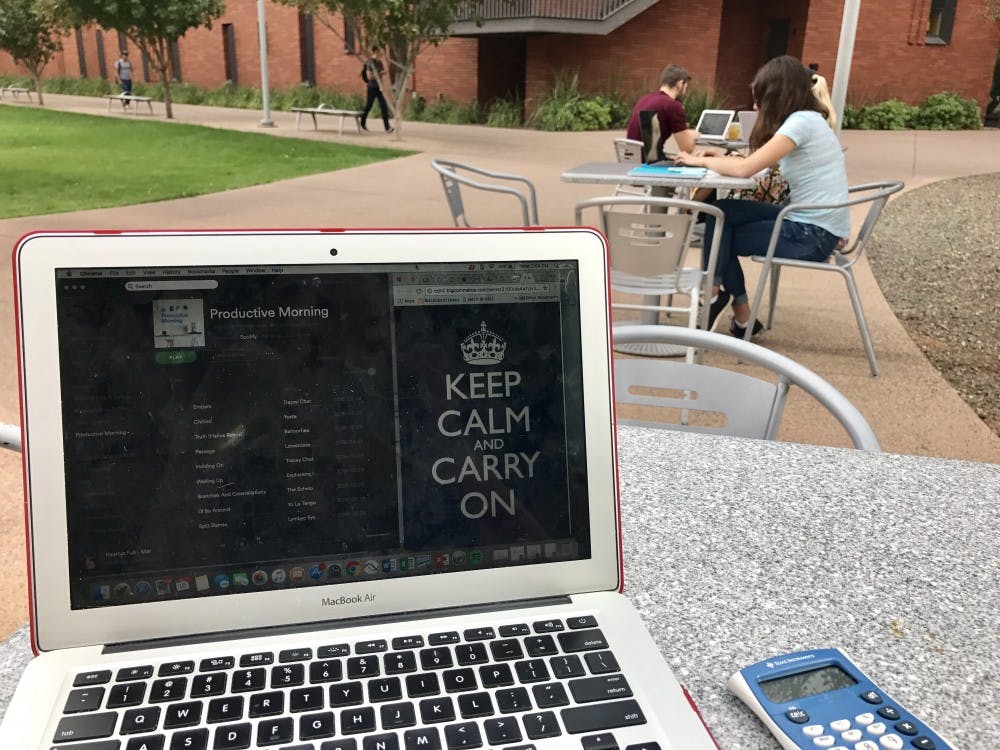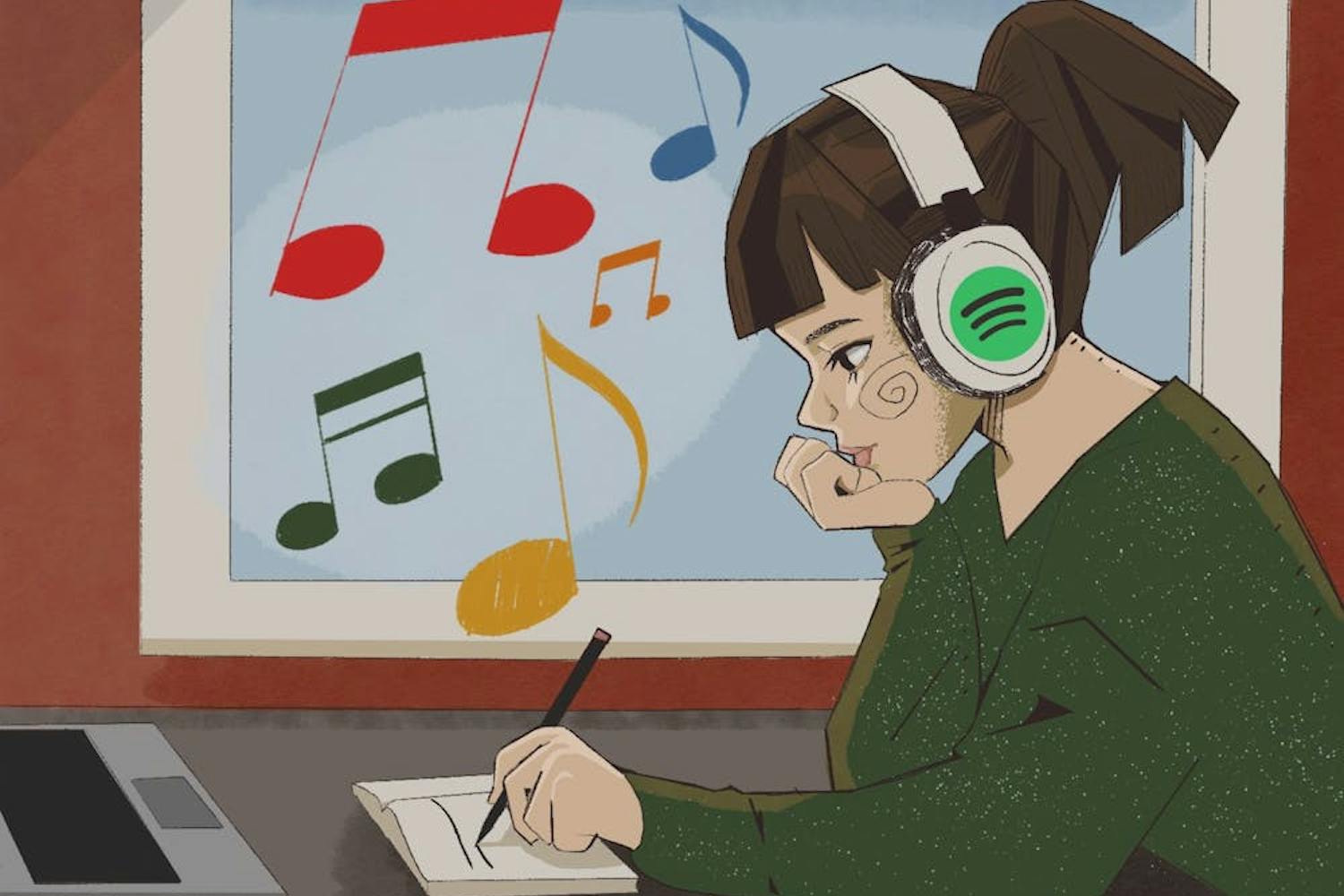As the semester winds down, it's easy to let yourself slip through the cracks.
While the distant glow of winter break taunts you, you have thousands of words to write and hundreds of flashcards to memorize. Weighed down under deadlines, self-care often becomes the last priority on your list.
However, if self-care is at the bottom of your to-do list, it's time for some serious reordering.
When you neglect your emotional health, you become more burnt-out and less productive. When stress gets in the way of self-care, you isolate yourself and perpetuate unhappiness.
Self-care involves intentionally acting to preserve or improve your health – be it physical, mental or emotional. While self-care will manifest itself differently for different individuals, small changes in daily habits can have huge impacts.
Dr. Aaron Krasnow, associate vice president of ASU Health Services and ASU Counseling Services, said it's normal for students to feel overwhelmed at the end of the semester, and it's important for students to acknowledge those feelings.
According to Krasnow, at the end of the semester, students often experience a gap between their coping skills going down and their schoolwork going up.
"Feeling burnt out is a function of an accumulation of little stressors over time," he said.
Krasnow suggested making small changes in habits like diet, sleep and exercise rather than making radical lifestyle changes. Well-intentioned radical changes may end up overwhelming students more, especially if they are unable to follow through with those changes and are left feeling like they have failed.
"Try to make little changes in your lifestyle which will accumulate over time and reduce feeling overwhelmed," he said.
While many students may want to prioritize self care, it can be hard to know where to start. Here are six small changes that can make a big difference in the face of the end-of-the-semester blues.
1. Break a sweat.
I get it: You're already stressed, and the last thing you need is someone nagging you to work out. Still, it's well-known that exercise can reduce stress and anxiety and improve your mood. Try going to one of ASU's free Devil X classes, where you can dance, kickbox or row away your worries. You can also opt for a yoga class on campus, or check out a studio near campus like Hot Yoga University, where students under 25 with an ID can attend a class for free on Thursdays.
2. Feel less tired without having to sleep more.
Obviously, it would be nice if you could get a full eight hours of sleep every night. But let's be honest – it's just not going to happen. Instead, focus on getting the most out of the time you do spend under the covers with two great apps: f.lux and Sleep Cycle.
The bright light emitted by your phone and computer during late-night paper typing and Facebook browsing can disrupt your natural sleeping cycle. By adjusting the light admitted by your devices depending on the time of day, f.lux promises to help you rest easier. Similarly, Sleep Cycle is an alarm clock application that analyzes your sleeping patterns and wakes you up while you're in the lightest phase of sleep, which will help make rising and shining just a little less painful.
3. Turn to Spotify for playlists that will help you study in style.
At its best, music can make studying a little more bearable – and if nothing else, at least it can drown out the obnoxious couple having a loud and irrelevant conversation on the library's silent floor. You might not have time to curate your own playlists, but that's what Spotify is for. Try the "Productive Morning" or "Acoustic Covers" playlists for mellow but motivating songs.
4. Use ASU Counseling and other University resources as tools.
ASU Counseling Services provides individual and group counseling for students who feel like they would benefit from talking with a professional. Walk-in, crisis and consultation services are free, and subsequent individual and group counseling appointments cost $15 per session.
"The whole environment at ASU is designed to support students who are experiencing stress," Krasnow said.
In addition to counseling, which may not be the solution for every student who is experiencing stress, Krasnow highlighted the Career Center, fitness centers, dining halls and Dean of Students office as examples of other organizations dedicated to supporting student wellness.
As the semester winds down, keep an eye out for stress management events put on by ASU Wellness or other campus organizations.
5. Admit when you're just not OK.
As you push through finals season, you will probably field inquiries about how you are with a shallow "I'm fine" or "I'm OK." While gritting your teeth and bearing it is helpful sometimes, it's also important to be honest with yourself and admit when you're not OK. Be aware of your mental health, seek help if you need it and don't be afraid to take a step back.
6. Opt outside while stu(dying).
Studies have demonstrated that being outdoors helps improve concentration, boosts short-term memory, reduces stress and improves mood. Since ASU is probably one of the only places where you can study outside in November without putting a jacket on, you really have no excuse to be holed up indoors.
Now go fork your finals – and remember to love yourself in the process.
Reach the columnist at maarmst7@asu.edu or follow @MiaAArmstrong on Twitter.
Editor’s note: The opinions presented in this column are the author’s and do not imply any endorsement from The State Press or its editors.
Want to join the conversation? Send an email to opiniondesk.statepress@gmail.com. Keep letters under 300 words and be sure to include your university affiliation. Anonymity will not be granted.
Like The State Press on Facebook and follow @statepress on Twitter.




